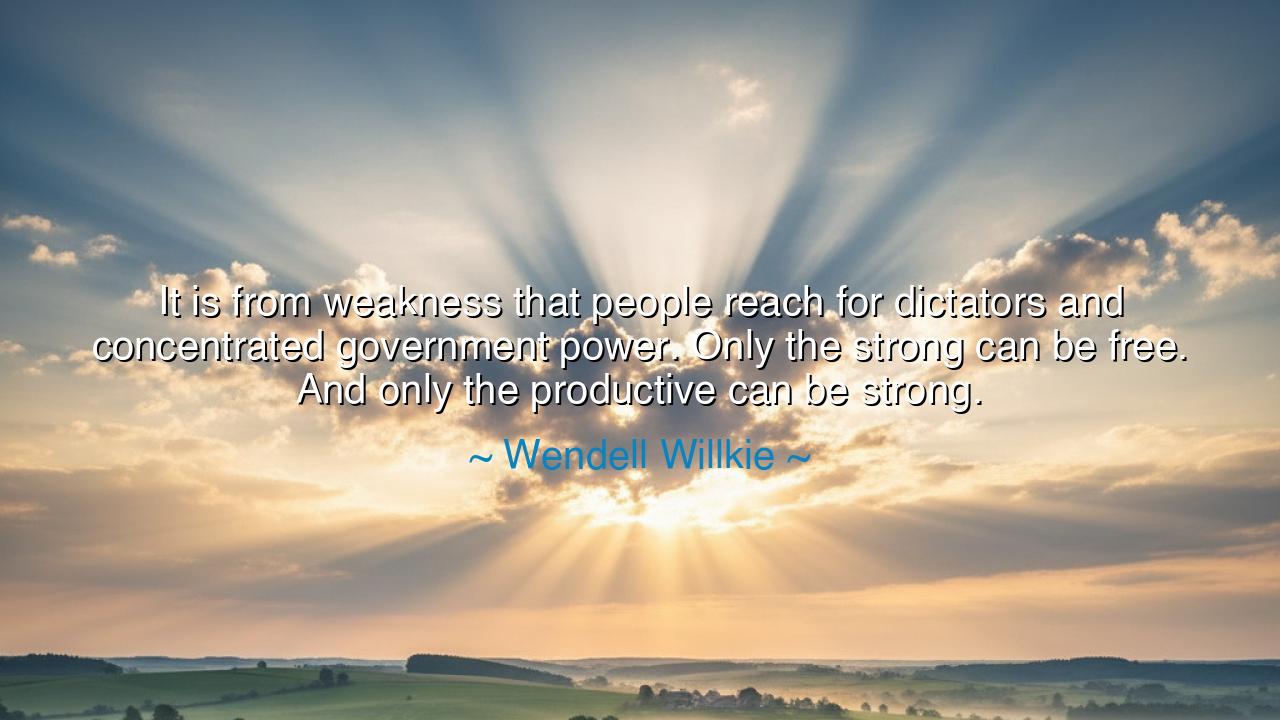
It is from weakness that people reach for dictators and
It is from weakness that people reach for dictators and concentrated government power. Only the strong can be free. And only the productive can be strong.






"It is from weakness that people reach for dictators and concentrated government power. Only the strong can be free. And only the productive can be strong." Thus spoke Wendell Willkie, the businessman turned statesman, who in the dark days of the Second World War stood as a defender of liberty and of the indomitable human spirit. His words echo across time as both a warning and a call to courage — a reminder that freedom is not a gift granted by rulers, but a prize earned and maintained through strength, virtue, and labor. For when a people grow weary or afraid, when they trade effort for comfort and responsibility for security, they open the gates for tyranny to enter.
Willkie spoke these words during an age when democracy trembled. Across the oceans, the fires of dictatorship burned — in Germany, Italy, and Japan, men worshipped power and promised order in exchange for obedience. Even within America, there were whispers that perhaps freedom itself was too chaotic, that perhaps a single strong leader could do what liberty’s messiness could not. Willkie saw this danger clearly. He understood that dictatorship is not born from strength, but from weakness — not from courage, but from fear. When citizens lose faith in their own ability to govern, to work, and to endure hardship, they begin to long for a master who will rule in their name.
The meaning of Willkie’s words, then, reaches beyond his time into the eternal cycle of human civilization. Every nation, in every age, faces this choice: to bear the weight of freedom, or to lay it down in exchange for ease. Freedom demands effort — the effort to think, to build, to take responsibility for one’s fate. It is the reward of the strong, and by strength Willkie did not mean brute force, but strength of character, of diligence, of self-discipline. When a society forgets how to work, how to create, how to sustain itself through honest labor and moral conviction, it becomes weak. And from that weakness comes the cry for rulers to take over — for the concentration of government power to replace the strength of individual virtue.
History bears grim witness to this truth. In the final days of the Roman Republic, the people, once proud and self-reliant, had grown decadent and dependent on the state’s largesse. The Roman Senate, once a gathering of thinkers and patriots, became a theater of corruption. Bread and circuses replaced purpose and duty. Out of that moral weakness arose Julius Caesar, and behind him, a line of emperors who ruled not through consent, but command. The people, weary of their own freedom, had surrendered it willingly. They thought themselves safe under imperial power — but in truth, they had traded their strength for slavery.
Willkie’s insight was not one of cynicism, but of faith — faith in the power of the productive spirit to keep liberty alive. “Only the productive can be strong,” he said, because the man or nation that produces — that works, that builds, that innovates — creates both wealth and character. Industry is not merely an economic act; it is a moral one. A productive people are self-reliant, capable, and proud. They do not beg the government to rescue them, nor do they worship leaders as saviors. They know that freedom, like prosperity, is something to be earned anew each day, not something to be demanded or decreed.
And yet, Willkie’s words carry a challenge to every generation. In times of uncertainty, fear whispers to us: Would it not be easier if someone else decided for us? If the government took care of everything? But this temptation, though it promises comfort, destroys dignity. The strength that sustains freedom can only be found within each individual — in courage, in labor, in faith, and in the refusal to be ruled by fear. A people that clings to self-reliance cannot be enslaved, for tyranny finds no foothold in the hearts of those who believe in their own strength.
The lesson is clear and eternal: freedom is not the child of weakness, but of strength — and strength is born of productivity and moral purpose. Let each person, therefore, strive to be strong: not in domination over others, but in mastery over self. Work diligently, think independently, and live with integrity. Build families, communities, and nations that stand not by decree, but by effort. For when the people are strong, the state remains their servant; but when they grow weak, the state becomes their master.
So remember the wisdom of Wendell Willkie: that liberty and strength are bound together as soul and body. A people who cease to strive, who wait for power to save them, will surely lose both their strength and their freedom. But a people who labor with courage, who hold fast to faith and work with willing hands, will remain forever free — not because their government grants it, but because their hearts are too strong ever to surrender it.






AAdministratorAdministrator
Welcome, honored guests. Please leave a comment, we will respond soon